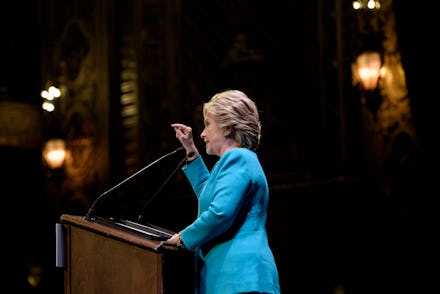Will Hillary Clinton raise or lower taxes? Here's who will pay more under Clinton's plan.

Democratic presidential nominee Hillary Clinton's tax plan is centered on a popular notion: Wealthy people could stand to pay more in taxes.
According to a recent Gallup poll, 53% of Americans agree the government should tax the wealthy more as a means of redistributing wealth.
Perhaps surprisingly, wealthy people actually agree: Among the poll's high-income respondents, those who said they want to pay more in taxes outnumbered those who said they want to pay less by more than four-to-one.
Clinton's plan delivers on that idea with a few key provisions.
What is the Buffett Rule?
One of the most talked-about provisions in Clinton's plan to reform the tax code is the so-called Buffett Rule.
The rule, named for billionaire investor Warren Buffett, is meant to make up for the fact that wealthy people can sometimes pay a lower effective tax rate than even the middle-class people who work for them.
Clinton's plan creates a "fair share surcharge," essentially a 4% tax surcharge for people making $5 million or more.
The tax hike would only affect only two out of every 10,000 people, and is designed to make up for the fact that millionaires have accountants, tax attorneys, and offshore accounts to help them reduce what they pay in taxes.
Clinton also plans to close tax loopholes for the rich, including one that currently leaves retirement accounts held by wealthy people largely untaxed.
What is the estate tax?
Another big reform Clinton has proposed — one with which she sharply diverges from Republican presidential nominee Donald Trump — is changing the estate tax to take a larger hunk of big inheritances.
The estate tax is levied on money or other assets that people leave behind when they die. Republicans often refer to it as the "death tax," and Trump has promised to repeal it.
Clinton's proposed increases to the estate tax are steep: In some cases, the rate would top 65% — although, to pay that, you'd need to be talking about an inheritance of $500 million or more.
Because of that high minimum, as scary as "death tax" sounds, it doesn't really affect that many people: Clinton claims that only four out of every 1,000 estates will be affected by her hikes, which are expected to raise $260 billion.
Will Clinton lower taxes for anyone?
Most of the tax relief proposed by Clinton comes in the form of tax credits — which are most likely to benefit low-income Americans and middle-class families with children — including her proposal to double the child tax credit.
Clinton has also proposed tax credits to help people with high out-of-pocket medical costs, as well as medical costs for those who are taking care of family members, including parents and grandparents.
Additionally, many voters could benefit from Clinton's $125 billion economic revitalization initiative, which includes proposals like earmarking funds for affordable housing and providing $5 billion to help formerly incarcerated Americans find jobs.